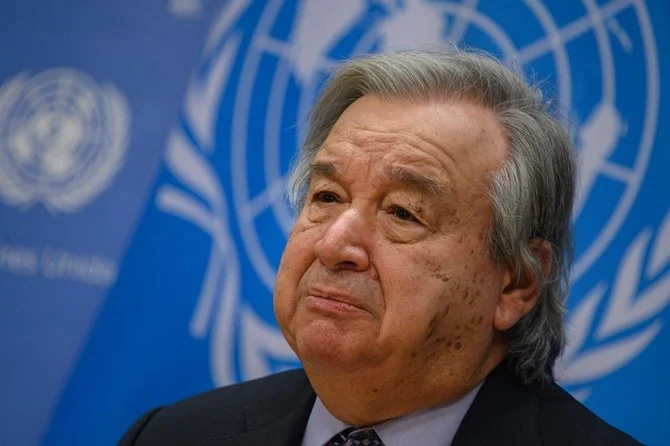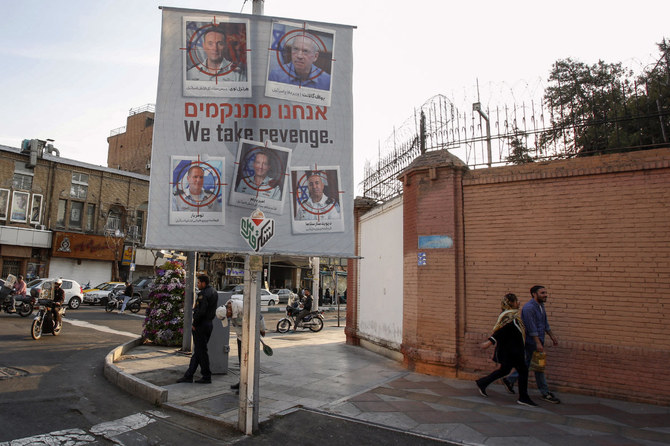LONDON: The United Nations chief expressed strong hopes Monday that the Ukraine war will end in 2023 and on other global hotspots condemned the Iranian government’s crackdown on demonstrators, urged all countries to fight terrorist threats from the extreme right and called on the international community to tell Israel’s new right-wing government that “there is no alternative to the two-state solution.”
In a wide-ranging end-of-year news conference, Secretary-General Antonio Guterres said he sees no prospect of talks to end the war in Ukraine in the immediate future and expects the already escalating military conflict to continue. But he called for everything possible to be done to halt the most devastating conflict in Europe since World War II by the end of 2023 — which he strongly hopes will happen.
On other issues, Guterres urged Afghanistan’s Taliban rulers to include all ethnic groups in the government, restore girls’ rights to education at all levels and women’s rights to work, and to stop all terrorist activity on its territory. And he reiterated the UN’s determination to pursue the denuclearization of the Korean Peninsula, saying the international community must also pursue this goal which “is fundamental for peace and security in east Asia and in the world.”
The secretary-general also had some advice for the managers of all social media platforms including Twitter: You have a responsibility to preserve freedom of the press and at the same time ensure that hate speech and extremist views, including of neo-Nazis and white supremacists, don’t find their way onto your platforms.
Looking back at 2022, Guterres said “there may be plenty of reasons for despair” — geopolitical divides that have made solving global problems difficult if not impossible, a cost-of-living crisis, growing inequalities with most of the world’s poorest countries “staring down the abyss of insolvency and default,” with debt service payments skyrocketing by 35 percent, the largest increase in decades.
But as the year ends, he said, “we are working to push back against despair, to fight back against disillusion and to find real solutions.”
The secretary-general pointed to the historic agreement reached early Monday on protecting the world’s lands and oceans that provides critical financing to save biodiversity in the developing world, saying, “We are finally starting to forge a peace pact with nature.”
He also cited “a measure of progress” in some conflicts.
In Ethiopia, he said, “efforts by the African Union to broker peace are a reason for hope.” In Congo, diplomatic efforts led by Angola and the East African Community have created “a framework for political dialogue” to end the crisis in the country’s mineral-rich east. In Yemen, a six-month truce “delivered real dividends for people” and even though it wasn’t renewed, “there have been no major military operations” and flights and fuel and food deliveries are continuing.
Even in Ukraine, he said, the July agreements brokered by the UN and Turkiye to restart grain deliveries from Ukraine and food and fertilizer exports from Russia “are making a difference.”
Without an immediate prospect for talks, Guterres said the UN is currently concentrating its efforts on expanding the initiative that has seen over 14 million metric tons of Ukrainian grain shipped from three Black Sea ports by increasing exports and inspections.
He said Russian wheat exports “have multiplied three-fold,” and the UN is looking into possibly exporting Russian ammonia — a key ingredient of desperately needed fertilizer — from a Black Sea port.
The UN is also very interested in accelerating the exchange of Ukrainian and Russian prisoners of war before Orthodox Christmas which both countries celebrate in January, the UN chief said.
On terrorism, Guterres urged condemnation of every form of extremism including neo-Nazism, white supremacism, anti-Semitism and anti-Muslim hatred in Western countries and elsewhere in the world.
“This is clearly a threat, and we must fight that threat with enormous determination,” he said.
Guterres pointed to the recent alleged coup plot in Germany in which more than 20 people linked to a far-right movement were detained as just one example of the threat to democratic societies around the world.
The secretary-general was also sharply critical of Iran’s crackdown on peaceful protesters, who took to the streets in September after the death of a 22-year-old woman taken into custody by the morality police and accused of not wearing her headscarf properly. Over 450 people have been killed and over 18,000 detained, according to Human Rights Activists in Iran, a group monitoring the protests.
“We are witnessing massive violations of human rights that we strongly condemned,” Guterres said, calling the Iranian government’s actions “totally unacceptable.” He said he raised the issue with Iran’s president in September and the UN has continued to protest to Iran.
As for the 2015 nuclear deal between Iran and six major powers known as the JCPOA, which former US President Donald Trump pulled out of in 2018, Guterres said “we will do everything we can in the context of our limited sphere of confidence to make sure” the agreement isn’t lost.
Negotiations on the US rejoining the deal, which eased sanctions on Iran in exchange for curbs on its nuclear program, have stalled. “We are at the present moment, in a serious risk of losing the JCPOA,” Guterres said, “which in my opinion would be a very negative factor for peace and stability in the region and further afield.”
On the decades-old Israeli-Palestinian conflict, Guterres was asked about more than 200 Palestinians killed this year, most of them civilians, and Israel’s election of the most right-wing government in its history, including members opposed to a Palestinian state.
He said the UN has been very clear in condemning violence against the Palestinians and is concerned “because we believe there is no Plan B to the two-state solution, and we are very concerned with what the next Israeli government might do in that regard.”
“I think it’s very important that the whole of the international community be very clear explaining to the government in Israel that there is no alternative to the two-state solution, and that no unilateral actions should be taken putting into question the two-state solution,” Guterres said.
AP






















